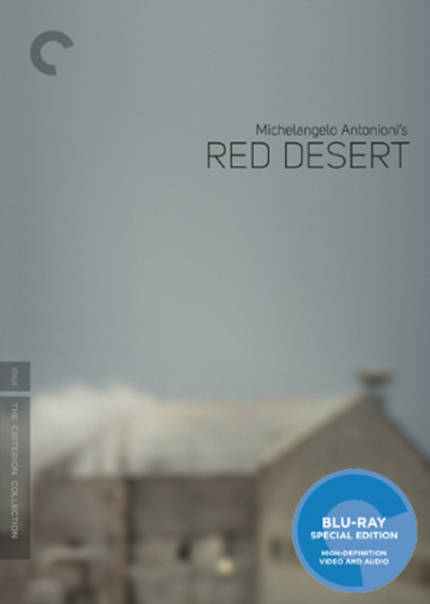Michelangelo Antonioni's RED DESERT Blu-Ray Review

Michelangelo Antonioni's 1964 film Red Desert is a bleak exploration of mental illness, alienation and environmental decay. The film is abstract, challenging and is arguably one of the most beautifully composed and photographed cinematic works of the past 5 decades. Honestly.
The film's tone is established immediately. The title sequence unfolds with panning out-of-focus shots of an industrial shipyard. The sequence abruptly cuts to an image of a refinery pipe shooting giant orange flames into the ash grey sky. In the next shot, the camera pulls back to reveal that the sky is gray due to smoke billowing from a nuclear cooling tower. The central characters are then introduced. Giuliana Salviatii (Monica Vitti) and her son Valerio arrive at the factory where her husband Ugo (Carlo Chionetti) is the manager. Ms. Salviatti was recently in a car accident, which has left her mentally unstable. Upon finding her husband, she meets Corrado Zeller (Richard Harris), who is working on a project. Corrado Zeller and Giuliana Salviatti quickly attraction, but the trajectory of their relationship is as doomed as the environment they inhabit.
Narratively, Red Desert doesn't follow a traditional arc. The story is more like a angled slope that slowly rises upward as Giuliana Salviatii's internal and external world deteriorates. The film is oblique and relies on images, as opposed to exposition, to tell the story. With that said, the themes are not hidden and the attentive viewer should be able to connect the threads.
The film's tone is established immediately. The title sequence unfolds with panning out-of-focus shots of an industrial shipyard. The sequence abruptly cuts to an image of a refinery pipe shooting giant orange flames into the ash grey sky. In the next shot, the camera pulls back to reveal that the sky is gray due to smoke billowing from a nuclear cooling tower. The central characters are then introduced. Giuliana Salviatii (Monica Vitti) and her son Valerio arrive at the factory where her husband Ugo (Carlo Chionetti) is the manager. Ms. Salviatti was recently in a car accident, which has left her mentally unstable. Upon finding her husband, she meets Corrado Zeller (Richard Harris), who is working on a project. Corrado Zeller and Giuliana Salviatti quickly attraction, but the trajectory of their relationship is as doomed as the environment they inhabit.
Narratively, Red Desert doesn't follow a traditional arc. The story is more like a angled slope that slowly rises upward as Giuliana Salviatii's internal and external world deteriorates. The film is oblique and relies on images, as opposed to exposition, to tell the story. With that said, the themes are not hidden and the attentive viewer should be able to connect the threads.
Although there is much satisfaction to be derived from an analytical reading of Red Desert, the film's true pleasure is in its imagery and sounds. It is hard to exaggerate how beautiful this film looks. The
shot composition demonstrates deep consideration of figures in space; actors are carefully positioned in relation to the rooms, buildings, streets, and other structures. More important the film's manipulation of space is its use of color.
Every single scene is meticulously color coordinated. Clothes, skin tone, eyes, and hair are color matched and contrasted with interior and exterior backgrounds.
This was Antonioni's first color film, and his use Technicolor, which had been abandoned by the time production began, the envelope of color cinemaphotography. Those interested in the specific technical processes employed here should refer to Murray Pomerance's excellent article linked at the bottom of this review.
One final element that deserves a discussion is the music and sound design. The dominant sound element is Vittorio Gelmetti's squiggly electronic score, which recalls Xenakis and Stockhausen. A recurring motif composed by Giovanni Fusco and sung by Cecilia Fusco is also used. The motif is set against Gelmetti's electronics in the title sequence, and later figures into one of the film's pivotal scenes. The use of the song in these two scenes creates a set of interesting contrasts that speak to some of the film's main themes.
The Criterion release of Red Desert is presented in 1.85:1. The uncompressed mono audio track is Italian with English subtitles. As usual, the Criterion provides a wealth of extras. In this case, an audio commentary by David Forgacs is included. There are two interviews: one with Antonioni and a lengthy talk with Monica Vitti from French television. Also featured are silent black-and-white dailies, two Antonioni shorts called Gente Del Po and N.U. (Nettezza urbana), and a theatrical trailer.
The Blu-Ray format is basically propped up by slick mega-budget studio movies. However, the true value of the platform is in bringing high-definition transfers of films like Red Desert to a wider audience. This Blu-Ray release really is "best of class."

Do you feel this content is inappropriate or infringes upon your rights? Click here to report it, or see our DMCA policy.






